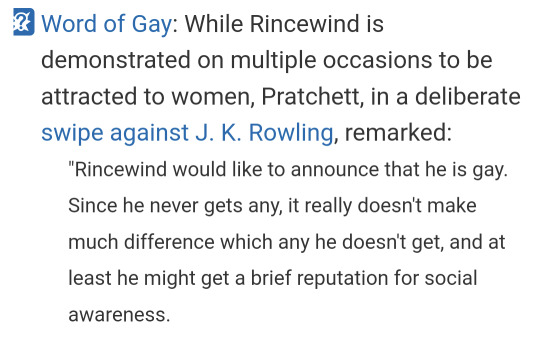Text
I think one of the Worst Things about wanting to find period clothing from other cultures, is trying to find fucking casual/work clothes. Like no, I do not want to see all these fancy intricate kimonos, I want to see jinbei, and field work outfits so I don't put a damn obi on this poor boy so he has a belt to hang his knife from.
89K notes
·
View notes
Text
(holding up a singular sewing needle) yes! i found it! now i can sew my shirts and sweaters and blankets and beanies and (trips and falls into another fucking haystack
12K notes
·
View notes
Text
you bet i paused the scene when Dean’s head is in the perfect alignment in front of this sign

His four favourite things 🥰
5K notes
·
View notes
Text
6K notes
·
View notes
Text
i thought my laptop was on its last leg because it was running at six billion degrees and using 100% disk space at all times and then i turned off shadows and some other windows effects and it was immediately cured. i just did the same to my roommate's computer and its performance issues were also immediately cured. okay. i guess.
so i guess if you have creaky freezy windows 10/11 try searching "advanced system settings", go to performance settings, and uncheck "show shadows under windows" and anything else you don't want. hope that helps someone else.
242K notes
·
View notes
Text
[“The crisis of the 1920s was relegated to the back burner by the Depression of the 1930s and the turmoil of World War II. But when peace and prosperity returned in the 1950s, aspirations for personal fulfillment and sexual satisfaction returned to center stage and were adopted by larger sectors of the population than had ever dared harbor such hopes before. As psychologist Abraham Maslow predicted in 1954, once people’s basic needs for survival and physical security were met, “higher order needs,” such as self-expression and high-quality relationships, began to take priority over material needs.
Men and women initially tried to find fulfillment at home. But when marriage did not meet their heightened expectations, their discontent grew proportionately. The more people hoped to achieve personal happiness within marriage, the more critical they became of “empty” or unsatisfying relationships.
Looking back on their lives a few decades later, men and women who had been in male breadwinner marriages in the 1950s and 1960s told interviewers that the division of labor in which they’d hoped to find fulfillment had so divided their lives that intimacy had become difficult, if not impossible.
Wives were especially likely to regret their choices. Of women interviewed during the late 1950s and 1960s, even those who were content with their marriages almost always wanted a different life for their daughters. When it came to her daughter, one woman told interviewers in 1957, “I sure don’t want her to turn out to be just a housewife like myself.” Another explained to the researchers in 1958 that she hoped her daughters would “be more independent than I was.” A third, interviewed in 1959, said nearly the same thing: “I want them to have some goal in life besides being a housewife. I’d like to see them make a living so the house isn’t the end of all things.”
What an interesting pattern, with what interesting implications for the future! A 1962 Gallup poll reported that American married women were very satisfied with their lives. But only 10 percent of the women in the same poll wanted their daughters to have the same lives that they had. Instead they wanted their daughters to postpone marriage and get more education. These sentiments were not conscious endorsements of feminism. The 1950s housewives who wanted something different for their girls did not expect them to choose lifelong careers. But they wanted their children to have more options for self-expression than their own lives had afforded. So they encouraged behavior in their daughters that, in combination with economic and political changes in the 1960s and 1970s, ended up overturning 1950s gender roles and marriage patterns.
Men had their own complaints about the typical family arrangement of the 1950s. In fact, Barbara Ehrenreich argues that it was men, not women, who first revolted against the male breadwinner marriage. Even before Betty Friedan voiced the discontents of the trapped housewife in her 1963 book The Feminine Mystique, men were detailing the discontents of the trapped breadwinner. In 1963, Friedan described the loneliness and alienation of housewives as “the problem that has no name.” But men had named the problem of the alienated breadwinner a decade earlier. They called it conformity. In his 1955 best seller Must You Conform?, Robert Lindner wrote that when a man tried to live up to all of society’s expectations at work and at home, he became “a slave in mind and body . . . a lost creature without a separate identity.” In his 1957 book The Crack in the Picture Window, John Keats described the suburbs as “jails of the soul.”
In 1953 Hugh Hefner founded Playboy magazine as a voice of revolt against male family responsibilities. Hefner urged men to “enjoy the pleasures the female has to offer without becoming emotionally involved”—or, worse yet, financially responsible. In Playboy’s first issue, an article titled “Miss Gold-Digger of 1953” assailed women who expected men to support them. Another article the same year lamented the number of “sorry, regimented husbands trudging down every woman-dominated street in this woman-dominated land.” By 1956 the magazine was selling more than one million copies a month.
Dissatisfaction was as high among the many people who subscribed to 1950s ideals of marital intimacy as among those who dissented from them. Historian Eva Moskowitz argues that the very advice columnists who were trying to help women save their marriages were also teaching wives to articulate their grievances. Alongside lessons in femininity and homemaking, the women’s magazines of the 1950s and 1960s nourished a “discourse of discontent” by promoting intimacy and self-fulfillment as the purpose of marriage. It was by reading about what marriage ought to be that many women saw what their own marriages weren’t.”]
stephanie coontz, from marriage, a history: from obedience to intimacy, or how love conquered marriage, 2005
13 notes
·
View notes
Text
Disgust has absolutely no ethical weight. If you are basing your ethical positions on the emotion of disgust you should stop, it is entirely unjustified and leads to a huge amount of harm.
137K notes
·
View notes
Text
Like, of course Alfred had to keep being the butler while he was raising Bruce, he came to America on a work visa.
1K notes
·
View notes
Text
did I tell you guys how much my boss spent on food delivery apps last year
15K notes
·
View notes
Text
I'll stop killing doctors the moment I stop reading people say "1mg E 50mg spiro"
864 notes
·
View notes
Text
(pa kent giving The Talk voice) see when a bull and a cow love each other very much, that’s how a calf is born [remembers his son came from space] of course if the bull comes from another farm, the cow might not end up taking, but that’s alright [remembers clark might be gay] sometimes bulls also love other bulls [remembers clark is an alien again] but if the bull is from another farm, he might have a calf if he fools around with bulls from here so he should be careful.
7K notes
·
View notes
Text
i will start sitting in a clearing holding a small stone and rubbing it with my hand for 10000 years to learn how to empathize with the river bed
28K notes
·
View notes
Text
Seein' too many Twitter refugees asking if they'll get in trouble for saying "kill yourself" to people and while no, you're not gonna get nuked from orbit, that is maybe something you just shouldn't be doing in general perhaps?? Maybe telling people to kill themselves is bad actually?? Some of y'all are wild, why is the first thing you can think to ask on a new platform if you can send one of the worst kinds of harassment to people?? Grow tf up and learn how to use the block button. It'll do wonders for your mood, trust me.
55K notes
·
View notes
Text

This is sooo annoying and I mostly hate that:
- It glorifies and highlights Israeli opinion after almost two years of complete dismissal of Palestinian documentation and testimony, absurdly positioning the Israeli judgement of the situation above that of those who were dodging the missiles of Israel's genocide in Gaza.
- This and many articles like it work so hard to make it sound like what's happening is an issue with the current Israeli government, lead by Netanyahu, in an effort to conceal Israel's genocidal history that led to this moment. As if the genocide in Gaza is due to the current corrupt government of Israel, and not Israel's policy and the ideology it was built on.
- Headlines like this started to emerge more recently when the famine could no longer be obscured, which signalled a prime opportunity for genocide deniers who want to be cleared of their complicity to cling to their opposition to the "famine" as it seems to be a more "palatable" argument to make, instead of denouncing the ongoing genocide.
- The focus of articles like this on the famine in Gaza overlook the past two years of manufactured consent of an incremental genocide against a besieged population, and centre the argument around how "aid should be allowed in" instead of calling for the decades long siege to be lifted and for the occupation to end, and challenging the regimes and dismantling the systems that have enabled and sustained this violence.
Just remember that articles like this as well as the current reluctant outcries from Israel, represent the desperate attempt of a dying apartheid colonial system to save itself. They have been well aware of the famine and the genocide the entire time, but chose now to speak against it because of the international outcry.
166 notes
·
View notes

